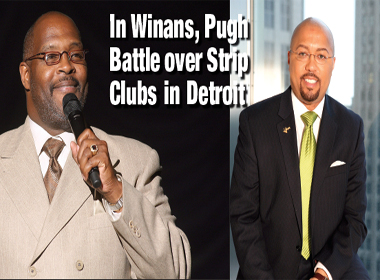
Detroit is often called the city of God, a label that is used to describe the Black religious tradition of this city.
Steeped in the historical fight for social and economic justice for African Americans, Detroit’s Black church wielded the same power that the Abuna (Bishop) of Ethiopia once had.
Back then the Abuna had to officially consecrate every king that was installed in that North African country, the only nation that successfully fought to remain un-colonized on the continent of Africa.
So like the Abunas of Ethiopia, we saw the power of Detroit’s religious leaders come to bear in the bitter 2005 mayoral election that almost landed candidate Freman Hendrix on the 11th floor of the Coleman Young Municipal Center, until incumbent Kwame Kilpatrick came out in a radio commercial to declare that Detroit is a city of God.
Like a religious edict, Kilpatrick’s declaration had a rapid-fire effect. It rallied most of the city’s church leadership behind him that was once so divided over his candidacy.
His mistakes during his first term in office were overlooked because the majority of the church leadership in this city stood behind him on the grounds of redemption, a pillar of the Christian faith.
Looking back, it appears that Kilpatrick was clever enough to use the Jesus factor and played to the sensibilities of the faith community. So he was reelected in part because the Sunday morning pulpits were beating the drums for his reelection.
And so in 2010, Detroit finds itself again with a powerful reminder of how significant the Black church is.
This time around, that reminder is not playing out in another bitter reelection battle over who becomes the next mayor. It is not the fight to stop the proliferation of liquor stores in Detroit, unlike any other place in Michigan, sometimes almost becoming a one-stop shop for drug pushers.
Rather, it is the fight to control activities that take place inside strip clubs where women dance nearly naked as male patrons shower them with dollar bills. Obviously, the goal is that if those titillating activities inside the strip clubs are curtailed, including banning VIP rooms where dancers give their male patrons lap dances, serving alcohol, etc., it could discourage the proliferation of such exotic clubs in Detroit.
Leading the moral crusade against these strip clubs and their overwhelming presence in the city is the Rev. Marvin Winans of Perfecting Church. The campaign is a resurgence of the place that Black churches occupy in this city’s ever-evolving future.
As I watched Winans take on Detroit City Council President Charles Pugh at a council session, it was like seeing Goliath go against David (except in this instance the roles are reversed because David may not be able to defeat Goliath).
Winans knew that he was acting in the large religious tradition of the church battling with the power of political expediency in Detroit. The church always had a voice even if that voice has waned in recent times.
While it is plausible to believe that he is not speaking for all of his congregation, Winans has thrust himself to the center of an emotional issue that has serious economic implications for those who are supportive as well as against strip clubs.
I am not a moralist and I strongly do not believe in legislating morality. A South African minister, Rev. Elijah Maswanganyi, once told me in an interview that although apartheid in South Africa may have ended through constitutional means, it can still remain in the hearts and minds of the people.